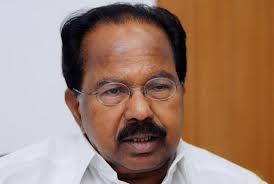
Bengaluru, Feb 18: Oil Minister M Veerappa Moily today ruled out a roll back in the Rs 1.50 a litre hike in petrol and 45 paisa per litre increase in diesel rates saying only a small raise has been passed on to consumers.
"No, No," was he refrain when asked if the government will consider rolling back last week's increase. "Our country imports 73-75 per cent of oil. We need to pay Rs 7 lakh crore for the imports. Where do we find that kind of money," he said.
The first hike in petrol price in over three-and-a-half months and the second rise in diesel rates in one month exclude local sales tax or VAT, making the cost for consumers even higher.
Petrol price in Delhi went by Rs 1.80 to Rs 69.06 per litre from February 16. Diesel rates went up by 51 paise to Rs 48.16 a litre.
"I think everybody would appreciate that we have not put a lot of burden on consumers. It is only small doses," Moily said.
The increase in auto fuel prices, which come on back of a similar small hike in diesel price last month, is expected to fuel inflation that stood at three-year low of 6.2 per cent in January. And there has been demands for a rollback.
"The money (to pay for oil import) can be either found by raising taxes or passing it on to the consumers," he said.
Indian Oil Corporation (IOC), the nation's largest fuel retailer, announced an increase of Rs 1.50 per litre in petrol price as international benchmark oil prices climbed 7.5 per cent.
The diesel rate was raised in line with last month's government decision to allow oil firms to raise prices in small doses every month till over Rs 10 a litre loss on sale of India's most consumed fuel is totally eliminated.
Even after last week's and a similar hike effected on January 18, oil firms will continue to lose Rs 10.27 a litre on diesel as cost of raw material (crude oil) has risen by 4 per cent to USD 113.24 per barrel.
"Whenever there is over-recovery (profit on sale of petrol), we have made it clear that it has to be passed on to consumers. So last month you saw a 25 paisa reduction in rates," Moily said.
Prior to February 16 hike, petrol price was last revised on January 18 when the rate was cut by 25 paise a litre. After including VAT, this translated into a reduction of 30 paise to Rs 67.26 a litre in Delhi.
The reduction in rates on that day coincided with the government decision to give oil firms freedom to raise diesel prices in small monthly doses to eliminate all of the losses on the fuel. Oil firms hiked diesel price on that day by 45 paise, which after including VAT led to a 50-paise increase to Rs 47.65 a litre in Delhi.
The price of petrol was last hiked on October 27 when rates went up by 29 paise after government raised commission paid to petrol pump dealers.





Comments
Add new comment